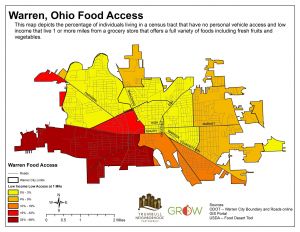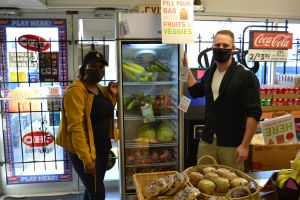Trumbull County Partners Transforming Convenience Stores to Community Stores
HCP-MV Partners Bring Resources, Partners, and Healthy Foods to Trumbull County Convenience Stores
Corner Stores. Convenience Stores. Bodegas. Mom and Pops. Everybody’s seen them, probably even stopped in to grab a soda, a sweet treat, or a scratch off. Though there is likely one within a short distance of your home or office. But, though these small stores have a wide variety of offerings, they’re not usually associated with much of anything healthy.
Hopefully that is beginning to change as more convenience stores transition into community stores throughout the Mahoning Valley.
The United States Department of Agriculture (USDA) defines a convenience store as, “any locally owned retail establishment that sells food, offers Supplemental Nutrition Assistance Program (SNAP), and has around a 2,500 square foot or less footprint.” A community store builds off of this definition by recognizing the value that these small businesses provide to residents in the neighborhoods that surround them and the local economy by supporting them to begin offering healthier food choices, including produce.
According to Trumbull Neighborhood Partnership’s 2017 Food Security Strategic Plan, there are over 40 of Convenience Stores throughout Warren compared to 4 grocery stores and 1 supermarket, not all of which are accessible to residents who experience transportation barriers. In the 2018 Community Health Needs Assessment, 16% of Warren City residents reported experiencing a lack of access to transportation, and that number increases to 21% for African American residents.
The lack of regular access to healthy, affordable foods in Trumbull County was also recognized by the Food Research and Action Council in 2018 “How Hungry Is America?” report, which shows that the Mahoning Valley is the second most food insecure region in the country. This has been a recognition and designation that leaders across the Trumbull County and Mahoning Valley heard as a call to action and seen as inspiration for innovation.
The 2017 Food Security Strategic Plan recommended giving convenience stores another look, one that peers past the plastered posters for soda, cigarettes, and sweets and towards the potential that these small businesses could offer to their neighbors. There’s an argument to be made for quantity and quality. At a ratio of 44:6, there are 7 times as many convenience stores as there are grocery stores in the City of Warren. And, many of the convenience stores are locally owned and operated, so they are family businesses who understand the importance of needing to put food on the table.
Many other communities across the country have considered reconsidering the convenience store as a community store. The Food Trust, a nationally recognized leader in food justice efforts, developed a case study and healthy corner store initiative guide for new coalitions to engage with business owners to make gradual, healthy changes to their stores. They even created the Healthy Corner Stores Network to “support efforts to increase the availability and sales of healthy, affordable foods through small-scale stores in underserved communities.” The USDA has also issued a guide to help convenience stores sell healthier foods.
The Ohio Department of Health has a developed similar model through the Good Food Here Program. It was this model that Trumbull Neighborhood Partnership and the Trumbull County Creating Healthy CommunitiesCoalition researched and followed to start conversations with store owners in Warren.
Since the 2017 Food Security Strategic Plan was released, Trumbull Neighborhood Partnership, with the support of the TrumbullCounty Food Access Coordinator, Christian Bennett-Mosley, has been successful in engaging 7 convenience stores to consider becoming community stores that offer fresh produce to their customers. The initiative continues to grow and attract support to expand throughout Warren and Trumbull County.
With the announcement in October of a $25,000 investment from the Healthy Food for Ohio Fund and an earlier $5,000 investment awarded from the United Fresh Foundation, the healthy community store initiative has attracted $30,000 to improve healthy food access to families in the city of Warren as well as providing support to small businesses.
Additionally, the healthy community store fostered relationships between two community stores, Lit’l Macs Food Store in Warren and more recently Cottage Market in Niles, with Flying High, Inc.’s GROW Urban Farm, which fulfill the role of produce distributor. Purchasing and distribution of produce is one of the most common barriers stores face when making the transition from convenience store to community store. Thankfully, TNP and the Trumbull County CHC have been able to close that gap and bring healthy food to another neighborhood. The partnership with Flying High also ensures that dollars spent on produce at the community stores supports local business, local food, and therefore the local economy.
As the Mahoning Valley, the state of Ohio, and the country continue to weather the co-occurring storms of COVID-19 and increasing racial health disparities, creating more regular access points in neighborhoods to healthy foods is critical. In an op-ed, “Corner Stores are the Pandemic’s Unsung Heroes in Urban Communities,” featured in Tap into Camden, Kate Foley and Emma Freedman highlight the increased importance that community stores have in their neighborhoods:
Corner stores have long been the essence of community in urban areas.
COVID-19 has highlighted the importance of corner stores to many communities: They are a vital part of the fight to decrease food insecurity, and in many ways are functioning as micro-level social service agencies, through their efforts to give to and sustain their communities.
The Healthy Community Store Initiative underway in Trumbull County and expected to expand into Mahoning County is
movingus back to a time when families could access what they needed in their neighborhoods. Davina van Buren, writing for StrongTowns, examines this movement backwards to go forwards in her article “Evolution of the Corner Store,” which chronicles the journey of the Bessemer Curb Market in North Carolina. Though many small grocers or convenience stores have been shuttered due to impossible competition from retail giants like Wal Mart, there is a resurgence and a reinvention of the convenience store in communities of all sizes across the country. The conclusion of this article offers a scenario that we hope to realize through the work of our partners in the Mahoning Valley:
They may look different than the corner stores of the past, but local retail establishments can still be a part of smart, sustainable development. As more metropolitan areas seek to ease traffic by making cities more pedestrian and bike-friendly, I hope we see the return of more corner stores. We can return to a time when residents had easy access to family-owned establishments that sold fresh, healthy food if we stay committed to improving the American food system. Corner stores aren’t just places to buy snacks, smokes, and lottery tickets—they are a valuable and underappreciated part of a close-knit community.
Congratulations to TNP, the Trumbull County Food Access Coordinator, and Trumbull County CHC on bringing food and community closer together.
Press Clips
Coalition Helps Bring Fresh Produce to Cottage Market in Niles
Fresh Produce to be Offered at Warren Store




